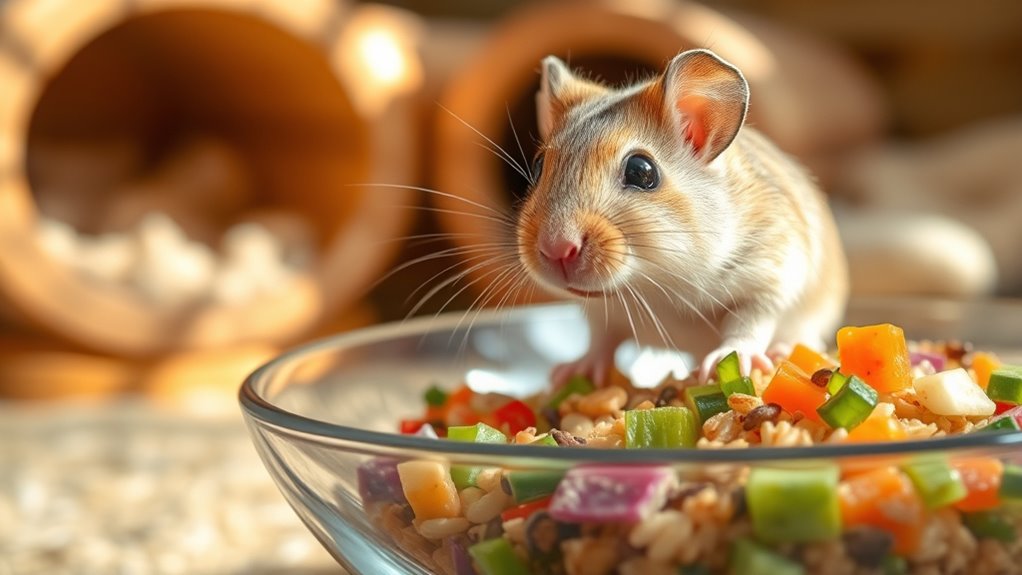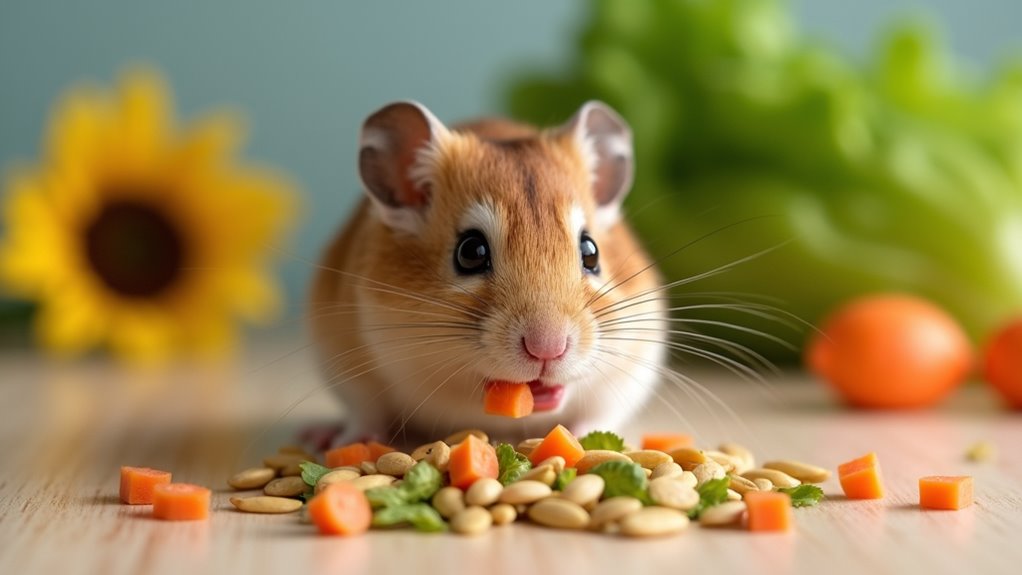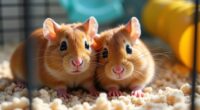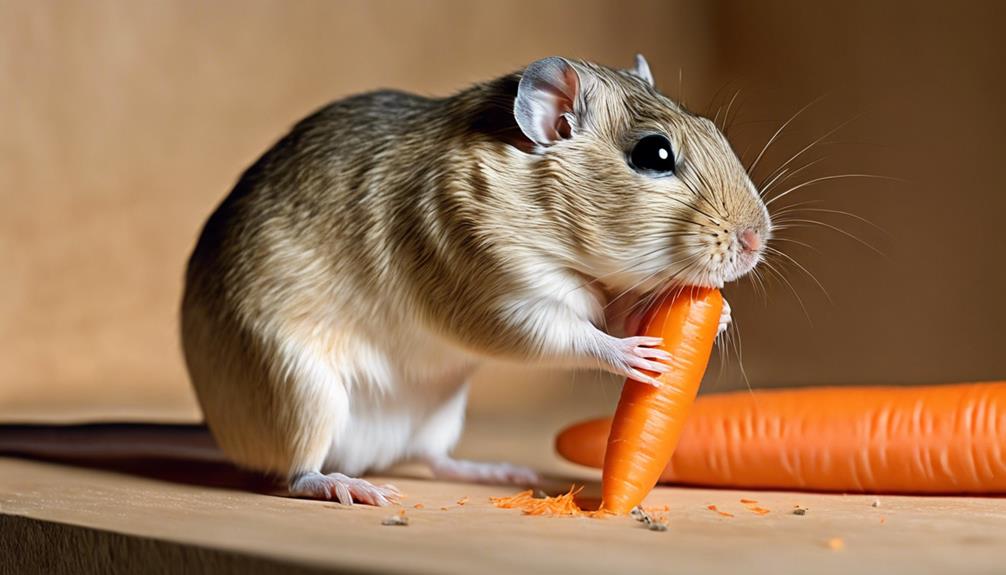To keep your gerbil healthy, feed it a mix of high-quality pellets, fresh vegetables like carrots and broccoli, and small amounts of fruit as treats. Offer food once daily and remove leftovers to prevent spoilage. Always provide fresh water and guarantee a consistent routine. Avoid processed human foods and sugary snacks. Maintaining a balanced diet supports dental health and overall well-being—continue to explore other tips for a happy, thriving pet.
Key Takeaways
- Provide high-quality, formulated pelleted food as the main diet to ensure essential nutrients.
- Supplement with fresh vegetables like carrots and broccoli, and occasional small fruit treats.
- Feed once daily and remove uneaten fresh foods after a few hours to prevent spoilage.
- Ensure constant access to fresh, clean water in a secure bottle.
- Monitor eating habits and weight to adjust diet and maintain overall health.

Feeding your gerbil properly is essential for keeping it healthy and happy. A well-balanced diet ensures your little pet gets the nutrients it needs to stay active, prevent health problems, and live a full life. Understanding the basics of gerbil nutrition is key to providing the right food and establishing an effective feeding schedule. Gerbils are omnivores, but their diet should primarily consist of high-quality, specially formulated pelleted food. These pellets are designed to meet their nutritional needs, containing the right mix of protein, fiber, vitamins, and minerals. Alongside pellets, fresh vegetables, small amounts of fruit, and occasional treats can add variety and enrichment to their diet. Just be cautious not to overfeed sugary or fatty foods, as these can cause health issues. Including variety in their diet isn’t necessary but ensuring their food is fresh and free from additives promotes overall health.
Creating a consistent feeding schedule helps your gerbil thrive. Most experts recommend offering food once a day, ideally in the morning or early afternoon. This routine helps your pet develop predictable habits and prevents overeating or food leftovers that can spoil. Always remove uneaten fresh foods after a few hours to prevent spoilage and maintain good hygiene in the cage. Fresh water should be available at all times, ideally in a secure, leak-proof bottle that’s cleaned regularly. Hydration is just as vital as nutrition, so check the water supply daily and refill as needed. A properly balanced diet also supports healthy dental development, which is crucial for gerbils. Proper diet and nutritional balance are fundamental to your gerbil’s health and longevity.
When planning your gerbil’s diet, consider the balance between the pellet food and fresh additions. Pellets should compose about 70-80% of their daily intake, providing a steady source of essential nutrients. The remaining 20-30% can include fresh vegetables like carrots, broccoli, or cucumber, which add hydration and fiber. Small amounts of fruit like apples or berries can be treats, but only a few times a week—remember, too much sugar isn’t good for them. Avoid giving your gerbil processed human foods, salty snacks, or sugary treats, as these can cause obesity, dental problems, or gastrointestinal issues.
Pay attention to your gerbil’s eating habits. If you notice that it’s not eating much or is losing weight, check the quality of its food and feeding schedule. Consistency is crucial; sudden changes in diet can upset their digestive system. Also, monitor for any signs of illness or discomfort, which might indicate nutritional deficiencies or other health problems. By maintaining a proper feeding schedule and focusing on gerbil nutrition, you’ll help ensure your pet remains energetic, healthy, and happy for years to come. Proper diet and care are fundamental to gerbil health and longevity.
Frequently Asked Questions
Can Gerbils Eat Human Food Safely?
You might wonder if gerbils can eat human food safely. While some safe snack options exist, you should be cautious about human food risks, like high fat or sugar content, which can harm your pet. Avoid giving them processed foods, sweets, or salty snacks. Instead, offer small pieces of fruits or vegetables as occasional treats. Always research first and consult a vet to guarantee you’re keeping your gerbil healthy and happy.
How Often Should I Change My Gerbil’S Water?
Imagine your gerbil’s tiny world—clean water and good health. You should change its water daily to guarantee water hygiene and meet its hydration needs. Fresh water prevents bacteria buildup and keeps your pet energized. Even if it drinks little, daily changes support its overall health. Skipping days can lead to illness. So, make it a daily habit to refresh the water for a happy, healthy gerbil.
Are Treats Necessary in a Gerbil’S Diet?
Treats aren’t necessary in your gerbil’s diet, but they can be a fun way to provide enrichment. The importance of treats lies in maintaining nutritional balance; giving too many can lead to health issues. You should offer treats sparingly, focusing mainly on a balanced diet of high-quality pellets, hay, and fresh vegetables. This way, your gerbil stays healthy, happy, and well-nourished without disrupting its essential nutritional needs.
What Signs Indicate a Dietary Deficiency?
Are you aware that overlooking your gerbil’s diet is like ignoring a ticking time bomb? Nutritional deficiencies can silently damage your pet’s health. Watch for signs like lethargy, weight loss, abnormal fur, or difficulty moving. These health symptoms indicate potential nutritional deficiencies. Regularly check your gerbil’s behavior and appearance. A well-balanced diet prevents deficiencies, keeping your tiny friend happy and healthy for years to come.
Can Gerbils Eat Fresh Fruits Daily?
You might wonder if gerbils can eat fresh fruit daily. Yes, fresh fruit safety is generally good, but you should keep fruit serving size small—about a teaspoon per day—to prevent overeating and digestive issues. Offer a variety of fruits like apple slices or berries, but always remove seeds and pits. Monitoring your gerbil’s reaction helps make sure they enjoy the benefits without any health risks.
Conclusion
Feeding your gerbil the right diet keeps it healthy and happy. Remember, a balanced mix of seeds, grains, fresh vegetables, and occasional treats provides essential nutrients. Did you know that gerbils can live up to 4 years with proper care? By following these feeding tips, you guarantee your tiny friend stays energetic and vibrant throughout its life. So, stay consistent, and watch your gerbil thrive in your care!










